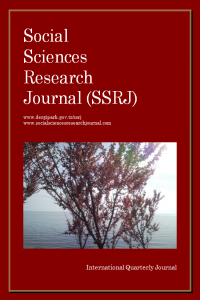Bilimsel Araştırmalarda Yaklaşım ve Tasarıma Kuramsal Bir Bakış
Bu çalışmada bilimsel araştırma metodolojisi literatürüne katkı sağlayacak ve araştırmacılara metodoloji tasarlamada yardımcı olacak ayrıntılı metodolojik bilgi sunulması amaçlanmıştır. Bu amaç doğrultusunda araştırma metodolojisine ilişkin literatür ayrıntılı şekilde taranmıştır. Özellikle lisansüstü hazırlanan tezlerde görülen araştırma tasarımıyla ilgili eksiklikler bu çalışmanın ortaya çıkmasını sağlamıştır. Yapılan bilimsel çalışmaların bazılarında araştırma modelinin seçimi ve yazımında yalnızca ansiklopedik bilgilerin verildiği ve seçilen yöntemin gerekçesinin sunulmadığı belirlenmiştir. Çalışma araştırma metodolojisine geniş bir perspektiften yaklaşmaktadır. Öncelikle bilim ve bilimsel araştırmanın tanımı üzerine yoğunlaşan bu çalışma, sonrasında araştırma yaklaşımlarına odaklanmıştır. Araştırma yöntemleri uzunca bir zamandır pozitivist ve natüralist anlayışa dayalı olarak nitel ve nicel şekilde ikiye ayrılmıştır. Bu iki yaklaşım dünya görüşü ve sosyal gerçeklik açısından birbirinden ayrılmaktadırlar. Sahip oldukları ontolojik, epistemolojik ve aksiyolojik varsayımlar iki yaklaşımın birlikte kullanılmasında bazı sorunları da beraberinde getirmektedir. Nicel yaklaşım araştırmacının araştırmadan uzak olduğu, gerçekliğe nesnel şekilde yaklaşırken, nitel yaklaşım ise araştırmacının araştırmaya yakın olduğu ve gerçekliğe öznel şekilde yaklaştığı araştırma yöntemleridir.
Anahtar Kelimeler:
bilim, bilimsel araştırma, bilimsel araştırma tasarımı, nitel yaklaşım, nicel yaklaşım
___
- Aliaga, M., & Gunderson, B. (2002). Interactive Statistics. Sage Publications.
- Babbie, E. (2010). The practice of social research. 12th Edition, Wadsworth, Belmont.
- Blumberg, B., Cooper, D. R. & Schindler, P. S. (2005). Business Research Methods. McGraw-Hill Education.
- Burns, N. (1989). Standards for qualitative research. Nursing Science Quarterly, 2, 44-52.
- Clifford, W. (1924) A Survey of Educational Research in 1923, The Journal of Educational Research, 9(5), 357-381, Doi: 10.1080/00220671.1924.10879465.
- Creswell, J. (2003). Research design: Qualitative, quantitative and mixed methods approach (2nd ed.). Sage Publication.
- Creswell, J., & Plano Clark, V. (2007). Designing and Conducting Mixed Methods Research. Sage Publication.
- Creswell, J. W. (2009). Research design: Qualitative, quantitative, and mixed methods approaches. Sage Publication.
- Creswell, J. W. (2015). A concise introduction to mixed methods research. Sage Publication.
- Cropley, A. (2021). Qualitative research methods: A practice-oriented introduction for students of psychology and education. Doi: 10.13140/RG.2.1.3095.6888)
- Crotty, M. (1998). The foundations of social Research: Meaning and Perspective in the Research Process. Sage Publication
- Çaparlar, C. Ö., & Dönmez, A. (2016). What is Scientific Research and How Can it be Done? Turk J Anaesthesiol Reanim, 44, 212-218. Doi: 10.5152/TJAR.2016.34711.
- Florczak, K. L. (2014). Purists need not apply: The case for pragmatism in mixed methods research. Nursing Science Quarterly, 27(4), 278-282. Doi: 10.1177/0894318414546419.
- Gall, M.D., Gall, J.P., & Borg, W.R. (2007), Educational research: An introduction (8th ed.). Pearson.
- Grey, D. E. (2014). Doing research in the real world (Third ed.). Sage.
- Good, C. V. & Scates, D. E. (1954). Methods of Research: Educational, Psychological, and Sociological. Appleton-Century-Crofts, Inc.
- Guba, E. & Lincoln, Y. (1994), “Competing paradigms in qualitative research”. In N. Denzin and Y. Lincoln (eds.), Handbook of Qualitative Research (pp. 105-117). Sage Publication.
- Hammer, D., Russ, R., Mikeska, J., & Scherr, R. (2008). Identifying inquiry and conceptualizing students’ abilities. In R. Duschl & R. Grandy (Eds). Establishing a Consensus Agenda for K-12 Science Inquiry (pp. 138-156), Sense Publishing.
- Hawking, S., & Mlodinow, L. (2010). What is reality? In The grand design (pp. 39-59). Bantam
- Hunter D. (2010). Locating ethics in research. In: Hughes J (ed.). European Textbook on Ethics in Research. Studies and Reports European Commission (pp. 15-19). Publication Office of the European Union.
- Kothari, C. R. (2004). Research methodology. New Age International Limited Publishers.
- Kumar, S. (2011). Research methodology. Sage Publications.
- Lather, P. (2004). Scientific research in education: A critical perspective. British Educational Research Journal, 30(6), 759–772. doi:10.1080/0141192042000279486.
- McDonald, S. & Headlam, N. (2009). Research Methods Handbook. Centre for Local Economiy Strategies CLES. http://www.saaiks.net/wp-content/uploads/2016/08/research-methods-handbook.pdf
- McLelland, C. V. (2006). The nature of science and the scientific method. Geological Society of America.
- Nassaji, H. (2015). Qualitative and descriptive research: Data type versus data analysis. Language Teaching Research, 19(2), 129–132. Doi: 10.1177/1362168815572747.
- Neuman, W. L. (2003). Social research methods qualitative and quantitative approaches (5th ed.). Allyn & Bacon.
- Palmer, C., & Bolderston, A. (2006). A Brief Introduction to Qualitative Research. The Canadian Journal of Medical Radiation Technology, 37(1), 16-19. Doi: 10.1016/S0820-5930(09)60112-2
- Pearson, K. (1911). The grammar of science (Third ed.). Adam and Charles Black.
- Punch, K. F. (2005). Introduction to Social Research: Quantitative and Qualitative Approaches. Sage Publications.
- Ram, A. (2010). Research Methodology. Rawat Publication.
- Saunders, M., Lewis, P., & Thornhill, A. (2007). Research Methods for Business Students, (6th ed.) Pearson.
- Sun, Z. (2017). Science of research. Projects: Foundations of Human Reasoning. Doi: 10.13140/RG.2.2.15233.15204
- Strauss, A., & Corbin, J. (2008). Basics of Qualitative Research: Techniques and Procedures for Developing Grounded Theory (3rd Ed.). Thousand Oaks, London, Sage Publications.
- Tang, X., & Levin, D. M. (2009). The Scientific Method and Scientific Inquiry: Tension as in Teaching and Learning. Science Education, 94(1), 29 – 47.
- The Advanced Learner’s Dictionary of Current English (1952). Oxford Press.
- University of Rochester. Appendix E: introduction to scientific method. (Retrieved July 26, 2021 from https://www.extension.purdue.edu/extmedia/ID/ID-507-w.pdf
- Zachos, P. (2000). Setting theoretical and empirical foundations for assessing scientific inquiry and discovery in educational programs. Journal of Research in Science Teaching, 37: 938-962.
- Yayın Aralığı: Yılda 4 Sayı
- Yayıncı: Denta Florya ADSM Limited Company
Sayıdaki Diğer Makaleler
ASTAR KAZIMA TEKNİĞİNİN SERAMİK SANATINDAKİ UYGULAMALARI
Kimya Öğretmenlerinin Uzaktan Eğitimle Kimya Öğretimine İlişkin Görüşlerinin Değerlendirilmesi
Kemal Burak BAYKAL, Kübra AKILLI
Ombudsman Teorisi ve Hong Kong’da Ombudsman Deneyimi
Bilimsel Araştırmalarda Yaklaşım ve Tasarıma Kuramsal Bir Bakış
Depremlerin Hisse Senedi Getirileri Üzerindeki Etkisi: 2023 Yılı Kahramanmaraş Depremi Örneği
Ahmet Bora KIRKLIKÇI, Yusuf DILAY
ARTAN E-TİCARET HACMİNİN İSTİHDAM SAĞLAMA NOKTASINDA KENT EKONOMİSİNE ETKİSİ
